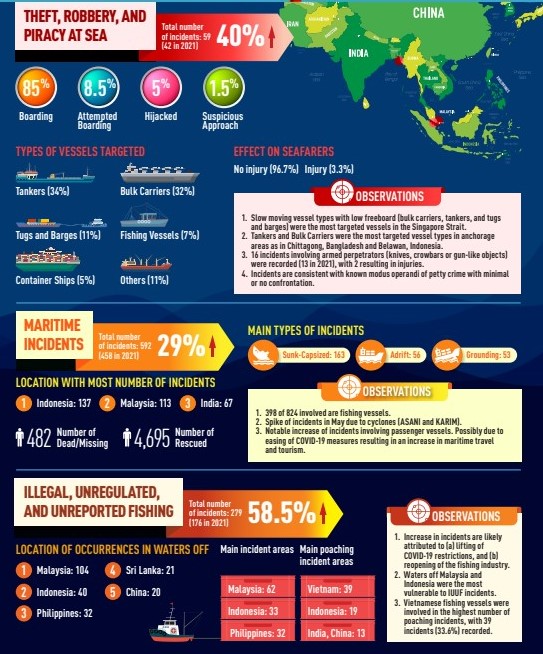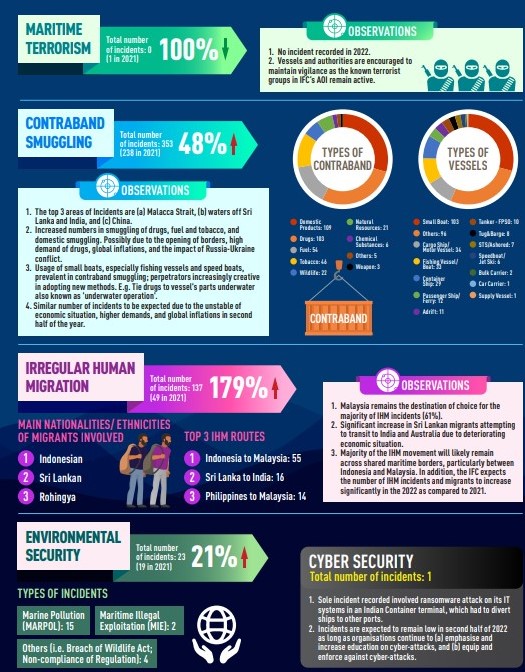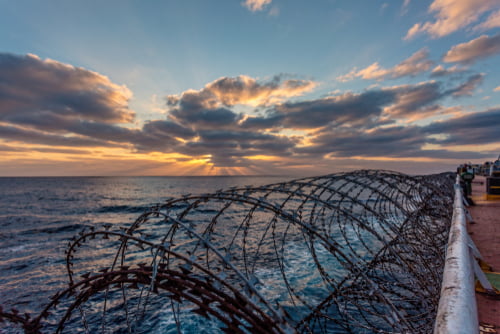The Information Fusion Centre’s (IFC) published its Mid-Year Report for 2022, providing an overview of the Maritime Security situation within the IFC’s Area of Interest in the first half of the year, and offers IFC’s assessment of what we can expect for the rest of 2022.
Theft Robbery and Piracy at Seas
From January to June 2022, the IFC recorded a total of 59 incidents in the IFC’s AOI; this was higher compared to the same period in 2021 (42 incidents), and 2020 (57 incidents), but lower than 2019 (65 incidents).
The overall increase is likely due to the combination of factors such as:
- The economic impact of COVID-19, which may have driven more people to resort to crime at sea to make ends meet
- More incidents being shared with the IFC by our partners
- More active reporting by shippers, possibly due to increased trust that authorities would take action.
The areas that recorded the highest number of incidents thus far in 2022 were
- The Singapore Strait
- Chittagong Port, Bangladesh
- Belawan Anchorage, Indonesia.

In the second half of 2022, the IFC expects the overall trend in TRAPS numbers to remain consistent with what was observed in the first half of 2022, with the possibility of spike as the impact of COVID-19 remains unpredictable.
Tankers were the most targeted vessels in the IFC AOI with 20 incidents (35%), followed by bulk carriers (33%). The remaining incidents involved tugs-and-barges (10%), fishing vessels (10%), container vessel (3), small boat (2), barge (1), vehicle carrier (1), pleasure craft (1), oil platform (1), and cargo vessel (1).
In the Singapore Strait, bulk carriers remain the prime target (50%), followed by tankers (36%), and tugs-and-barges (14%); this is due to them being slow moving with low freeboard. For incidents that occurred within anchorages and ports, tankers and bulk carriers were the prime targets especially in Chittagong, Bangladesh and Belawan, Indonesia.
Recommendations
- Remain vigilant: upon sighting of suspicious activities, immediately inform local authorities.
- Report all incidents, suspicious activities and presence of suspicious small boats in the vicinity to the nearest coastal state and flag state. Sound alarm when sighting suspicious boats/approaches in the vicinity of the ship.
- Participate in the IFC “Voluntary Community Reporting” as depicted in MARSEC Charts Q6112 and Q6113.
- Adopt Ship Protection Measures recommended in the Regional Guide to Counter Piracy and Armed Robbery Against Ships in Asia.
Maritime Terrorism
From January to June 2022, no Maritime Terrorism (MT) incident was recorded. The decline in overall incident numbers, compared to past years, is likely due to the strong enforcement by the regional countries, making it difficult for the potential terrorists to execute their activities. The IFC expects the number of MT incidents in the second half of 2022 to remain low as long as regional authorities are able to maintain their enforcement efforts.
Although no incidents of maritime terrorism were reported in 2022, authorities are encouraged to maintain vigilance toward any incident that may occur in future. Nonetheless, known terrorist groups remain active and the risk of MT incidents occurring within IFC’s AOI remains.
IFC advises all vessels with a low freeboard and/or low speed such as tugs, small tankers, heavy loaders, and pleasure boats to continue their vigilance while transiting in this area, so as to prevent being easy targets to MT.
Maritime incidents
From January to June 2022, a total of 592 maritime incidents were recorded. This is the largest number of maritime incidents recorded in this period since at least 2016, and is most likely due to the continuous improvement of data collection and incident reporting in the region.
The most prevalent maritime incidents are vessels sinking or capsizing, followed by adrift, grounding, vessel detained, and fires or explosions. These account for the majority of maritime incidents in IFC’s AOI and are consistent with previous years.
There are also indications that the rise in incident numbers could be due to the easing of COVID-19 measures across regional countries. As a result, sea traffic also increased, thus making incidents at sea more likely as well.
Based on the trending of the past two years, IFC expects to see an increase in incidents particularly during the months of July to October due to the onset of the monsoon season.

Environmental security
From January to June 2022, a total of 21 ENVSEC incidents were recorded in IFC AOI. Fourteen out of the 21 incidents (66.7%) were Maritime Pollution (MARPOL) consisting of liquid and solid pollution, making up the majority of the incidents, followed by the Others classification with four incidents (19%).
In terms of contagion, there was a decreasing trend from four incidents to one incident compared to the same period of 2021. This might be due to the reduced impact of COVID-19 which corroborated with the relaxation of COVID-19 restriction in Asia. If circumstances remain unchanged, the IFC expects ENVSEC incidents in the latter half of 2022 to remain similar to the earlier half.
March had the highest numbers recorded, accounting for eight out of the 21 incidents recorded in the first half of 2022. MARPOL consisting of liquid and solid pollution accounted for 14 incidents. Four incidents (19%) fell within the Others classification, with incidents involving Breach of Wildlife Act, damage reef, and non-compliance of regulation.
Nine of 14 MARPOL incidents were due to liquid pollution; they were caused by oil spill and leakage that occurred in Indonesia, Thailand, Papua New Guinea and India, while the remaining five of 14 MARPOL incidents were due to solid pollution, which were (a) dumping of waste in waters off China and also Maldives, and (b) coal from a stranded barge in waters off Indonesia.
The second large number of classification was reported as others in four incidents (19%) which involved Breach of Wildlife Act in both India and Malaysia, damage reef in Maldives and non-compliance of regulation in China. MIE recorded two incidents (9.5%) by illegal sea mining activity in both Indonesia and Malaysia.
Maritime cyber security
From January to June 2022, there was only one Cyber Security (CYBSEC) incident recorded in IFC’s AOI. The IFC expects the number of CYBSEC incidents in the second half of 2022 to remain low as long as the maritime industry continues to place emphasis on cyber security measures and improve cyber defence efforts.
This is the first CYBSEC incident reported in the IFC’s AOI. The incident occurred at Jawaharlal Nehru Port Container Terminal, which is one of five container terminals in India’s largest container port. The container terminal accounts for half of all the containers handled in India.
This incident reportedly caused the port to turn away ships to the other terminals in the complex located near Mumbai after suffering what is believed to be a ransomware attack on its computer systems. The attack did not leave any information on the perpetrator and no motives can be found so far.
The IFC expects the number of CYBSEC incidents in the second half of 2022 to remain low as long as (a) organisations continue putting emphasis and increasing education on cyber-attacks, (b) organisation are equipping and enforcing defence against cyber-attacks

































































